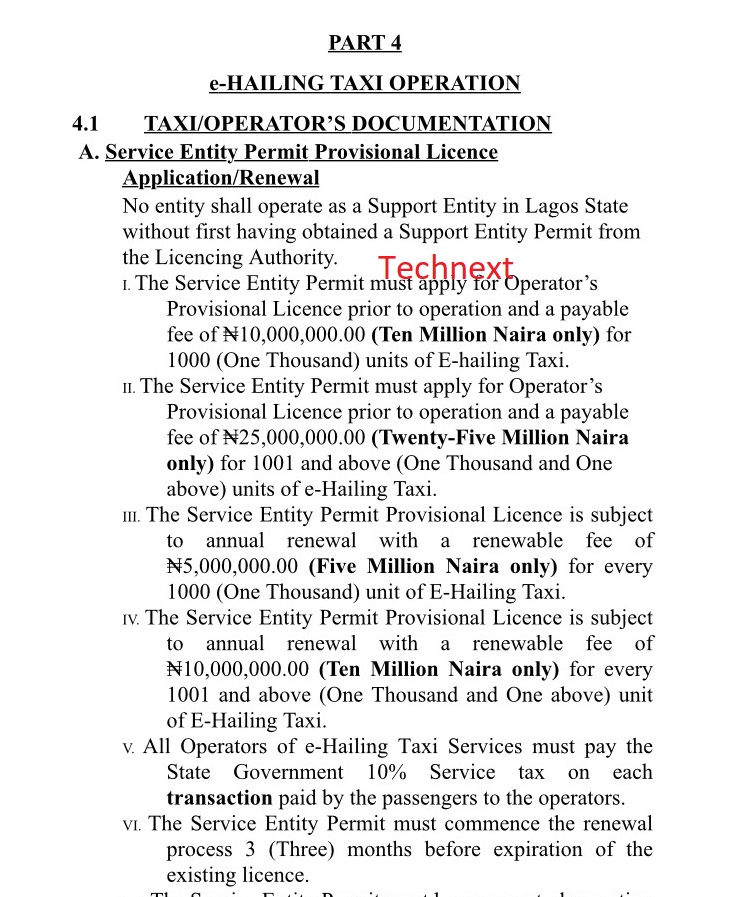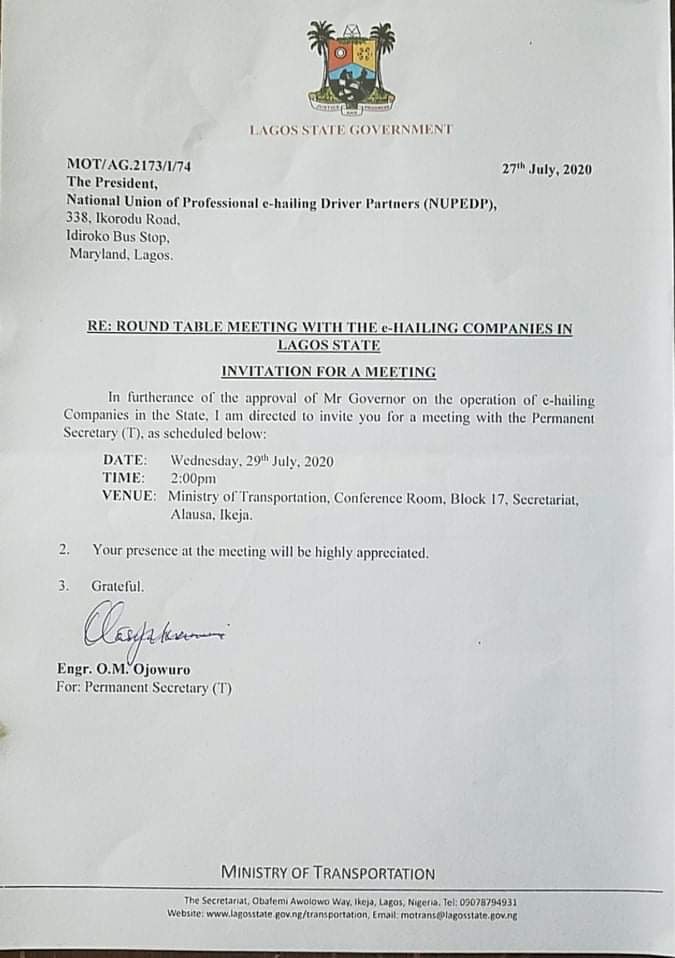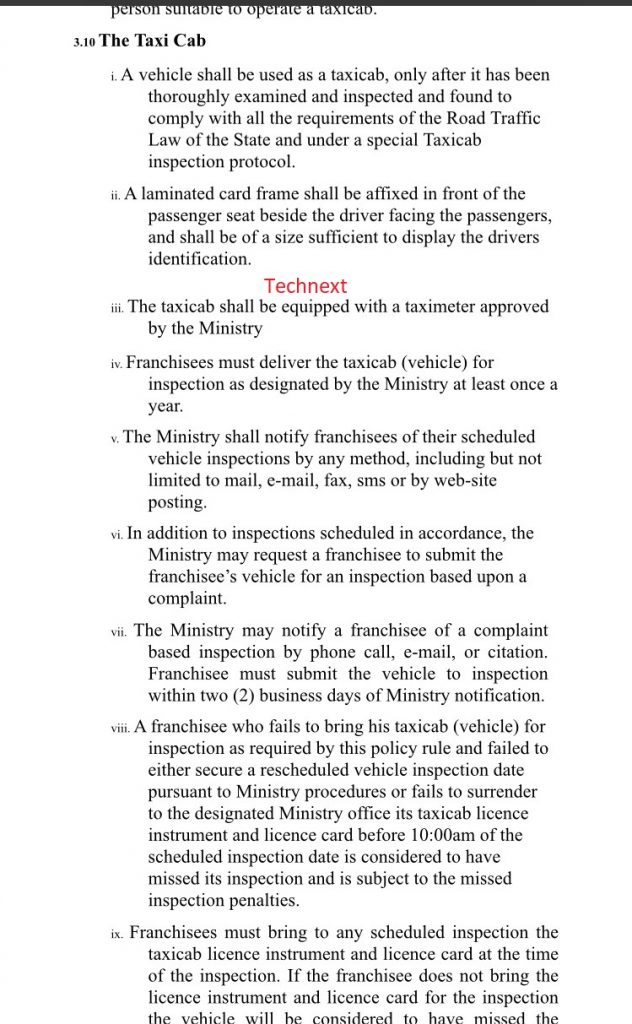The Lagos state government has finally put a time stamp on the commencement of its regulation of the e-hailing sector. According to a source, the regulations have been approved by the state governor, Mr Babajide Sanwo-Olu and implementation will commence by August 20.
The issue of regulating the e-hailing sector has been ongoing for a while, with e-hailing companies like Uber and Taxify facing off with the government and the driver-partners caught in between.
TechNext reported in March that the state government has finalised its plan to regulate the sector. Requirements stipulated for e-hailing companies include N25 million licence fee for companies with more than 1,000 registered vehicles and N10 million for companies with less.


Subsequently, companies will be required to pay annual renewal fees of N5 million and N10 million for companies with more than 1,000 vehicles. e-hailing companies are also required to remit 10% of each transaction per trip to the state government as service charge.
According to Segun Cole, the CEO of EkoCab, every e-Hailing vehicle will be required to carry the Lagos state taxi badge.
The new regulation also stipulates that Uber, Bolt and indeed all e-hailing drivers obtain LASDRI cards as well as a driver’s badge issued by the department of public transport and commuter services of the state ministry of transport.
But this development hasn’t gone down well with the Uber and Taxify drivers who insist that the state government is only after revenue, not real regulation.
According to the president of the National Union of Professional App-based Workers (NUPABW) Comrade Ibrahim Ayoade, the state government abandoned the union’s input which would have guaranteed real regulation of the sector.
Inadequate representation
According to the president, the new regulation is draconian because it was drawn up to further the government’s revenue drive. He said for such a policy to be truly regulatory it has to protect the interest of the three parties involved: the government, the hailing companies and the drivers. But that hasn’t happened.
“What the Lagos state government is trying to do is revenue drive, not regulation,” Com Ayoade said. “We had 5 meetings, Uber did not come to that meeting, Bolt did not come to that meeting. What I was expecting from Lagos state is to form a board of committee which will comprise app companies, driver-partners and the government representatives. These three stakeholders will now come out with a blueprint for the app industry. But that never happened.”
Comrade Ibrahim Ayoade, President of NUPABW


The comrade also decried the bunching up of both driver-partners and e-hailing companies as one entity, insisting that it has greatly undermined the drivers and ensured that their voices and demands are not considered.
“We told them we have driver-partner community and we have app companies. But they didn’t separate us. They merged us together. But I asked them, what are the requirements for operating as e-hailing driver-partners?If they want us to pay tax, that’s fine. But they should also tell us what all the money they collect will be used for. What are we getting in return? What will be the impact on our industry?”
No standard pricing system in e-hailing
In the world of e-hailing where competition is key, drivers have been known to suffer the most from promotions, price slashes and bonuses which act as stimulants for favourable competition. As such, while the cost of running their vehicles is on the rise, e-hailing companies keep slashing prices to attract more customers.
This has greatly reduced the earnings of drivers and with the new financial responsibilities coming up, drivers are already expecting the worst. Thus, an issue like pricing mechanism is what Mr Ayoade feels the government ought to have addressed as part of the new regulations but it didn’t.
“The reason why we were looking forward to the regulation of this industry is about the price mechanism,” he noted. “Fuel is N150/litre, even the government-backed BRT buses have increased their fares.
But because of competition among themselves, app companies reduce their own prices every day. Drivers should be able to operate freely and earn good money. Instead the government is thinking about only its own revenue. Is that the way to do regulation?”


A cursory look at the regulatory document by the Lagos state government dubbed the Guideline for On-Line Hailing Business Operation of Taxi in Lagos (shown above), revealed that the only reference to pricing is in Section 3.10 (iii) which stipulates that “the Taxicab shall be equipped with a taximeter approved by the ministry.”
There is no reference as to what charges are fair or what should determine pricing.
Potential backlash for driver partners
A major cause of worry for the driver-partners according to comrade Ayoade is that drivers will be the ones to suffer the financial burden of this ‘revenue drive’ by the state government. This, according to him, is because once the regulation is in force, e-hailing apps will simply hike up their commissions to meet up with their new financial expectations.
“Uber does not have money anywhere. Bolt does not have money anywhere. All the indigenous apps don’t have money anywhere. All the money the government is asking them to pay is coming from the driver-partner. The same driver-partner the government doesn’t understand, doesn’t respect, and don’t care how all of this affects them
Ayoade Ibrahim
He also accused the state government of using drivers as bait to get to the almost untouchable e-hailing companies, insisting that the government really can’t rein in e-hailing companies and as such must sacrifice the drivers.
Drivers as the major investors in the app business
Quoting the founder and CEO of EkoCab, Segun Cole, who during an interview with Technext asserted that all e-hailing companies have already agreed to the new regulation, the president expressed his disappointment at Uber and Taxify’s irresponsibility towards their drivers whom he said are the companies’ biggest investors.
“Drivers are the engine rooms of this industry. Uber and Bolt do not have vehicles, we brought our vehicles. Our investment in Uber is running into billions of naira. Yet we are the least respected people in this industry. If Bolt and Uber have agreed to this regulation, why can’t they inform their driver-partners who invested billions into their business? “


He also berated the LASG for only looking out for itself and failing to protect the partners.
Bad policies killing indigenous e-hailing apps
While Uber and Taxify are the biggest players in Nigeria, there has been several indigenous apps that have been on the scene. However, Mr Ayoade thinks a lack of proper regulation which guarantees healthy competition is why these indigenous apps don’t thrive.
Do you know that since 2012 till now, we have 250 indigenous apps that have come on board. But now you don’t hear of them again. Between 2017 and 2018, our objective was to come up with 3 indigenous app which we did. Apps like RideMe, Go247 and Trip. We promoted them, we endorsed them, we did everything for them.
Ayoade Ibrahim
Comrade Ayoade insists a lack of working policy which protects every player was one of the major reasons why many locally-engineered apps died in their infancy. He also expressed his shock that new players keep entering into the market without proper research to ascertain why the previous ones didn’t survive.
The comrade went on to recommend that local apps should pool their resources together and float just one single app. He said until there is proper regulation, that is the only way to survive against Uber and Bolt who could afford to splash big money for promos and discounted fares.
Other regulatory provisions…
Other provisions of the regulation stipulate that the vehicle must be brand new or at least less than 3 years old. The capacity of the vehicle must not be less than 1.3cc, it must comply with the requirements of Road Traffic Law of the State and must be brought for inspection at least once a year.
For the driver, s/he must be literate, at least 21-years-old and must have a valid drivers license, original Annual certificate of competence from Lagos State Drivers’ Institute (LASDRI card), and Lagos State Residents Registration Agency (LASRRA) Card.
According to the regulation, the LASG intends to assign designated waiting parks for e-hailing drivers






